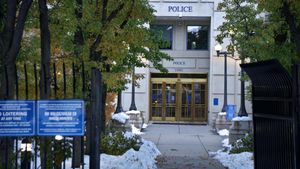Colleges across the United States are gearing up for what many anticipate as a significant wave of student activism as campuses reopen this fall. With heightened political tensions and recent events casting long shadows, issues ranging from the war in Gaza to social justice are expected to spark new movements among the student body.
Many students returning to campus have expressed their eagerness to raise awareness about international and domestic issues. These sentiments echo patterns seen during previous periods of socio-political unrest, reflecting the cyclical nature of student activism.
Factors contributing to this predicted resurgence include the recent conflict in Gaza, which has prompted immediate and fervent responses from student groups. Nationwide, protests have already begun, spotlighting the crisis and showcasing solidarity among students from diverse backgrounds.
Universities are preparing for large rallies and discussions surrounding the Gaza conflict, with groups mobilizing on campuses. The University of California has seen students organizing forums and rallies to not only discuss the plight of those affected but also to promote dialogue among students.
Administrators are aware of their pivotal role during these movements and are seeking ways to facilitate constructive dialogue. Many campuses are discussing methods to provide safe spaces for open discussion, considering the intense emotions surrounding such topics.
Student leaders believe this activism is fueled not just by the war itself but also by social media’s role in connecting like-minded individuals. Platforms like Instagram and TikTok have become critical tools for mobilization, allowing students to share information quickly and engage fellow classmates.
"Students today are more politically aware than ever," remarks Jenna Lee, co-chair of the College Democrats at New York University. "Social media enables us to organize and spread messages at lightning speed."
The broader backdrop of economic instability and rising tuition costs contributes to the urgency of student activism. Many are advocating for systemic changes, emphasizing how these issues intersect with topics like sustainability and equity.
Protests and walkouts are already underway as students seek to draw attention to their causes. At the University of Chicago, students are planning educational events alongside demonstrations, aiming to combine activism with informed discussions.
Beyond Gaza, students are also rallying for climate action, police reform, and mental health resources. This broad array of issues illustrates how interconnected and expansive student concerns have become.
The potential consequences of these movements are significant, and colleges are closely monitoring any developments. Discussions around academic freedom, safe spaces, and the rights to protest have erupted, highlighting the complex relationship between administration and student bodies.
Fears of backlash and conflict on campuses remain, with universities striving to maintain peace amid passionate disagreements. Officials are devising strategies to prevent escalation and to uphold the core mission of education.
Protests aren’t just limited to students; faculty members are also stepping up to lend their voices to the conversation. Professors across disciplines are supporting their students, participating openly in rallies and discussions.
Zooming out, this resurgence of student activism demonstrates the evolving nature of advocacy among young people. Students today are not only reacting to current events but are also invoking historical contexts to deepen their engagements.
Activism isn’t new on college campuses, though the issues have shifted over the decades. The similarities to movements from the 1960s—civil rights, anti-war protests—are palpable, leading some to draw parallels between today’s student movements and those of past generations.
Experts suggest this revival of activism may significantly shape political cycles. Many students are voting for the first time and taking positions seriously as they learn about their rights and responsibilities as citizens.
The tone among activists is one of hope mixed with urgency, as they organize to effect change. Plans for rallies, petitions, and awareness campaigns are the order of the day.
On the flip side, there are concerns about the lack of institutional support. Some student organizations insist universities could do more to engage with student voices, especially on pressing international issues.
The political climate across the nation is affecting how students view activism itself. A sense of urgency has emerged not just related to international issues but domestic policies touching education policy and funding.
Many student organizations are bridging gaps between different issues, linking the fight against the war with local community struggles. Campaigns encourage solidarity not only among students but also with residents who feel the effects of these national policies.
This interconnectedness showcases the evolution of student activism, moving beyond single issues toward broader, systemic change. Organizers are pushing their peers to think critically about how various societal issues are intertwined.
Some universities are actively engaging with these movements, promoting initiatives to empower students with materials and workshops. This approach aims to integrate activism within academic settings, encouraging scholarly inquiry alongside activist agendas.
Monitoring these developments, institutions aim to keep campus communities safe and vibrant. Amid protests, administrators strive to strike the right balance between expression and safety.
The energy observed now among students mirrors sentiments dialogues echoing across universities, calling for democracy, justice, and equality. With fall upon them, students are refusing to sit idly by, drawing on tradition to rise up once more.
With various causes emerging across campuses, one common thread seems to weave through all activism: the undeniable need for change. Whether it’s standing against war or advocating for climate justice, students are poised to take action.
The resurgence of student activism isn’t just expected—it’s here, and it’s shaping up to be audacious. This moment marks the beginning of renewed dialogue and dynamic changes within college campuses nationwide.



